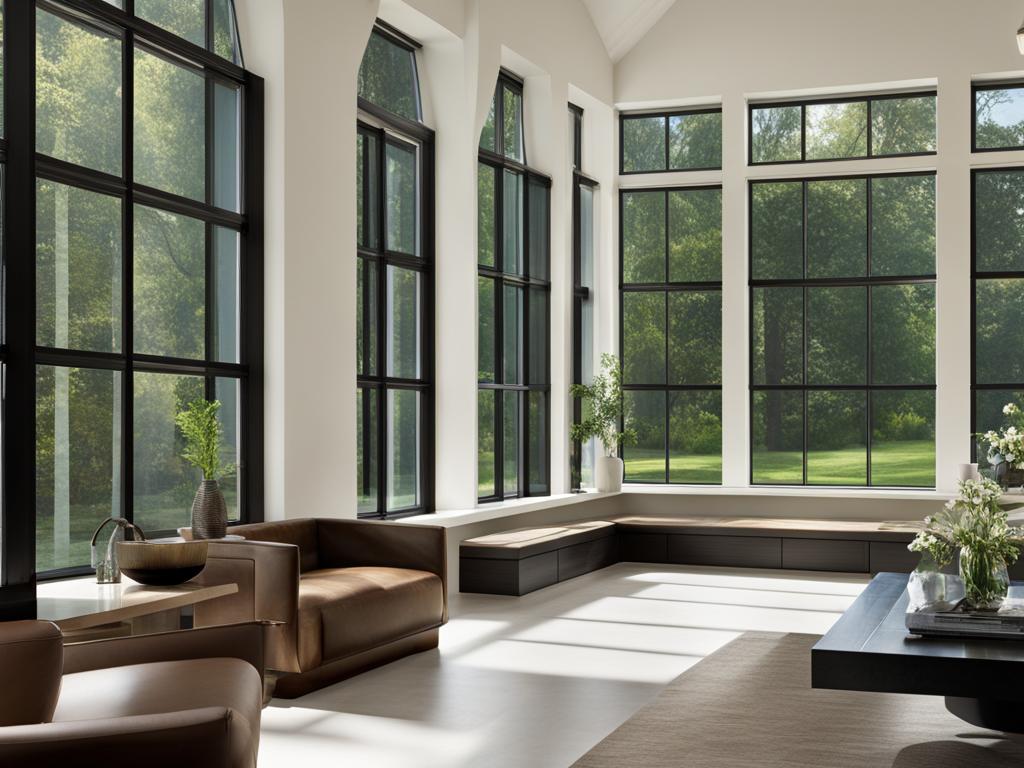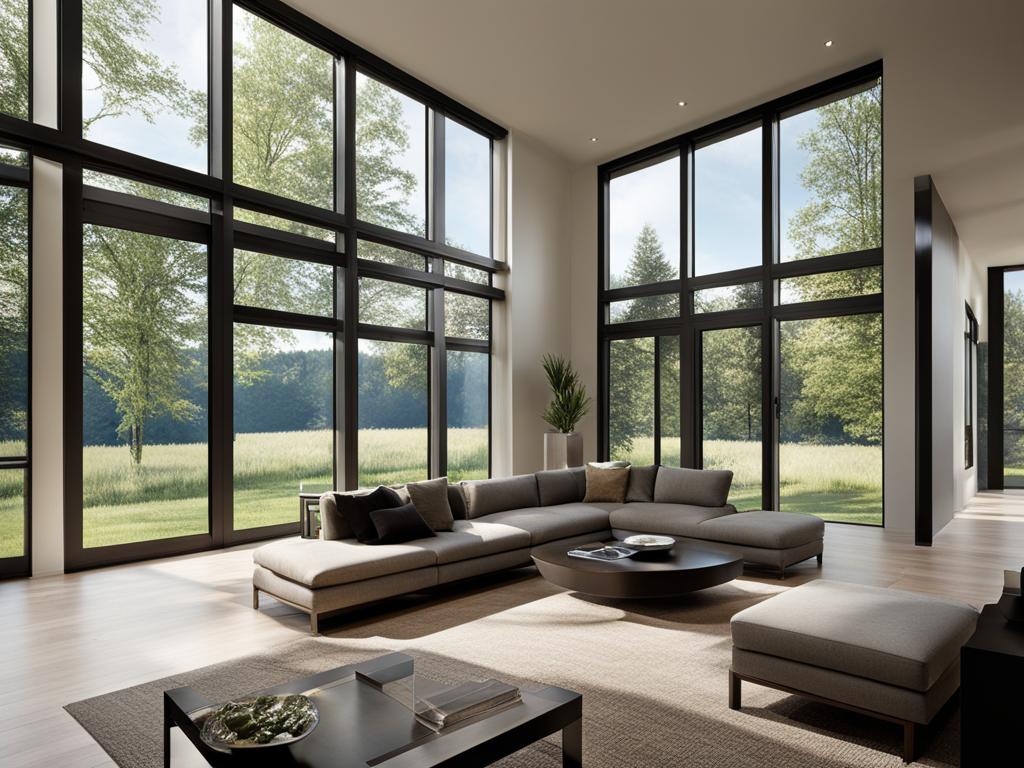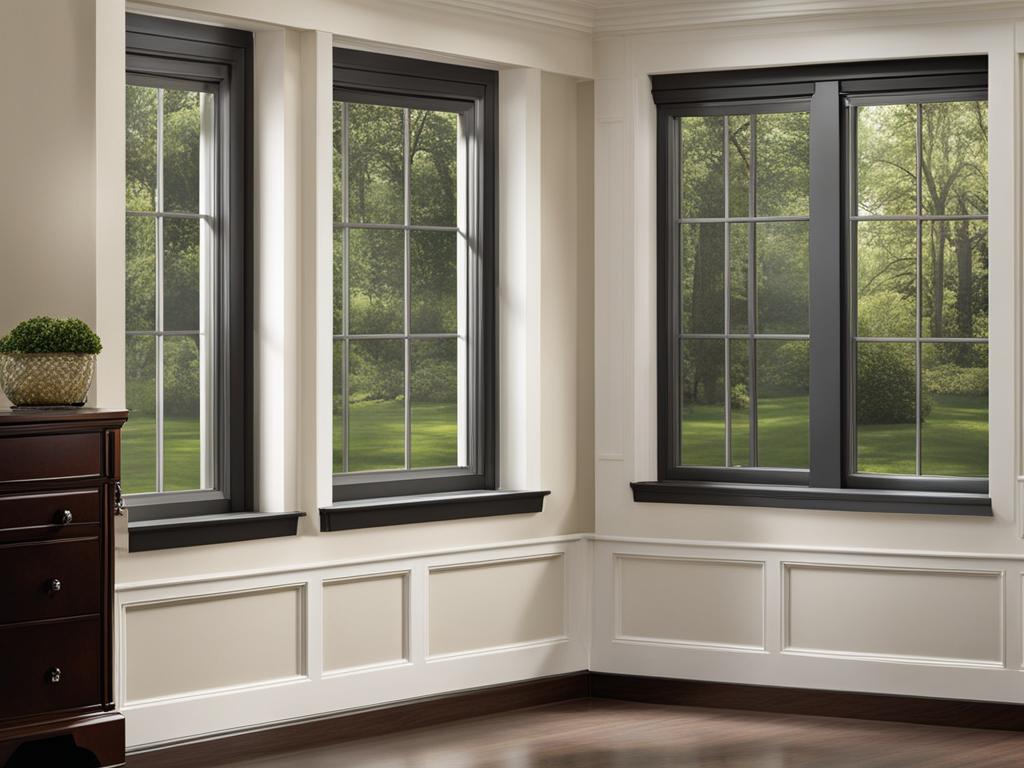When it comes to choosing replacement windows, Fibrex and vinyl are two popular options to consider. Each material has its own set of benefits and drawbacks, so it’s essential to understand the comparison between the two to make an informed decision. In this article, we will examine the durability, maintenance, cost, energy efficiency, installation, and appearance of Fibrex and vinyl windows to help you determine which option is better suited to your needs.
Key Takeaways:
- Fibrex offers superior durability, energy efficiency, and eco-friendliness compared to vinyl.
- Vinyl windows are more affordable and widely available, while Fibrex is exclusive to Andersen Windows.
- Consider factors such as durability, energy efficiency, maintenance, and cost when choosing between Fibrex and vinyl windows.
- Consult with a window professional to determine the best choice for your home.
- Both materials have unique advantages and disadvantages, so it ultimately comes down to personal preference and budget.
What Are Fibrex Windows?
Fibrex windows, made exclusively by Andersen Windows, are a revolutionary composite window material combining wood fibers and thermoplastic polymer. This unique blend of materials gives Fibrex windows exceptional strength and durability, making them a superior choice compared to traditional vinyl windows.
Using wood fibers and a thermoplastic polymer, Fibrex windows offer the perfect balance between the natural beauty of wood and the low-maintenance benefits of vinyl. The wood fibers provide strength and stability, while the thermoplastic polymer enhances durability and longevity.
Fibrex windows are not only known for their strength but also for their eco-friendly qualities. Andersen Windows uses reclaimed materials from their own manufacturing process to create Fibrex composites. By repurposing these materials, Fibrex windows contribute to a more sustainable future and reduce waste.
Designed to withstand various climates, Fibrex windows are highly resistant to warping, cracking, and rotting, making them an excellent choice for areas with extreme temperature fluctuations and high humidity. This durability ensures a longer lifespan for your windows, reducing the need for frequent replacements and saving you money in the long run.
Furthermore, Fibrex windows offer exceptional energy efficiency. Their advanced composite construction minimizes heat transfer, keeping your home cool in summer and warm in winter. This energy efficiency not only enhances your comfort but also helps lower your energy bills.
Overall, Fibrex windows provide a winning combination of strength, durability, eco-friendliness, and energy efficiency. With their timeless aesthetics, low-maintenance requirements, and long-lasting performance, Fibrex windows are a smart investment for any homeowner.
What Are Vinyl Windows?
Vinyl windows are a popular choice for homeowners due to their cost-effective nature and a range of benefits they offer. These windows are made of PVC (polyvinyl chloride) plastic, a material known for its durability and affordability. Vinyl windows provide excellent insulation, making them energy-efficient and helping to reduce energy usage in homes. This not only saves homeowners money on utility bills but also contributes to a greener environment.
Vinyl windows have a lifespan of about 20 years, making them a long-term investment for homeowners. The low-maintenance qualities of vinyl windows further add to their appeal. Unlike traditional wood windows, vinyl windows do not require painting or staining. They are resistant to moisture and do not rot or decay, eliminating the need for frequent repairs or replacements.
Another advantage of vinyl windows is their versatility in terms of size and appearance. They come in a wide variety of sizes, styles, and finishes, making it easy to find the perfect fit for any home aesthetic. Whether you prefer a classic or modern look, vinyl windows can be customized to enhance the visual appeal of your home’s exterior.

Key Benefits of Vinyl Windows:
- Cost-effective: Vinyl windows are more affordable compared to other window materials, such as fiberglass or wood.
- High energy efficiency: Vinyl windows offer excellent insulation properties, preventing heat loss or gain and reducing energy consumption.
- Low maintenance: Vinyl windows require minimal upkeep, eliminating the need for regular painting or staining.
- Durability: Their resistance to moisture, rot, and decay ensures a longer lifespan and fewer repairs or replacements.
“Vinyl windows provide homeowners with a cost-effective and low-maintenance solution while improving energy efficiency and overall comfort.”
| Vinyl Windows | Fibrex Windows | |
|---|---|---|
| Material | PVC plastic | Composite of wood fibers and thermoplastic polymer |
| Cost | Lower cost | Higher cost |
| Lifespan | Average lifespan of 20 years | Long-lasting, durable option |
| Energy Efficiency | Good insulation, reduces energy consumption | Superior insulation properties |
| Maintenance | Low-maintenance, no painting or staining required | Low-maintenance, no painting or staining required |
| Appearance | Customizable in various sizes and finishes | Customizable in various sizes and finishes |
Fibrex vs Vinyl: A Comparison
When comparing Fibrex and vinyl windows, Fibrex emerges as the superior option in terms of strength, durability, and eco-friendliness. Let’s take a closer look at the key factors:
Strength and Durability
Fibrex is twice as strong as vinyl, offering exceptional durability. It is resistant to decay, rot, and mold, ensuring long-lasting performance and structural integrity. Vinyl, while durable, is not as strong as Fibrex and may be more prone to warping and cracking over time, especially in extreme temperatures.
Thermal Expansion
Fibrex has a lower thermal expansion rate compared to vinyl, meaning it is less likely to warp and crack when subjected to temperature changes. This makes Fibrex windows more stable and reliable in various climatic conditions, providing peace of mind for homeowners.
Insulating Properties
When it comes to insulating properties, Fibrex outperforms vinyl. Fibrex windows effectively block thermal transfers, minimizing heat loss in the winter and heat gain in the summer. This contributes to improved energy efficiency and helps homeowners save on heating and cooling costs.
Compressive Strength
With its higher compressive strength, Fibrex is better equipped to withstand external forces and pressure. This makes it an ideal choice for areas prone to severe weather conditions. Vinyl, while sturdy, may not offer the same level of structural support as Fibrex.
Green Benefits
In addition to its strength and durability, Fibrex has significant environmental advantages. It is partially made from reclaimed materials, reducing waste and promoting sustainable manufacturing practices. By choosing Fibrex windows, homeowners can contribute to a greener future.
Overall, Fibrex surpasses vinyl in terms of strength, durability, thermal efficiency, and eco-friendliness. While vinyl windows may be more affordable and widely available, Fibrex provides long-term value and peace of mind. Investing in Fibrex windows ensures a lasting solution that enhances both the aesthetics and functionality of your home.
Pros and Cons of Fibrex Windows
When considering replacement windows, Fibrex windows offer several advantages worth considering. Let’s take a closer look at the pros and cons of choosing Fibrex windows for your home.
Pros of Fibrex Windows:
- Durability: Fibrex windows are known for their exceptional durability. They are resistant to decay, rot, and mold, ensuring they will last for many years.
- Energy Efficiency: Fibrex windows provide excellent insulation, helping to maintain a comfortable indoor temperature while reducing heating and cooling costs. This energy-efficient feature can result in long-term savings on utility bills.
- Low Maintenance: Fibrex windows require minimal maintenance compared to other materials. They are easy to clean and do not require painting or staining, saving you both time and money.
Cons of Fibrex Windows:
- Higher Cost: One disadvantage of Fibrex windows is their higher cost compared to vinyl windows. The superior durability and quality of Fibrex come with a higher price tag.
- Exclusive to Andersen: Fibrex windows are exclusively manufactured by Andersen Windows. This limited availability means that installation may take longer as they are not as widely accessible as vinyl windows.
Overall, Fibrex windows offer many benefits including durability, energy efficiency, and low maintenance. While the higher cost and exclusive availability may be considerations to keep in mind, the long-term advantages of Fibrex windows make them a popular choice for homeowners seeking lasting quality.

| Pros | Cons |
|---|---|
| Durability | Higher Cost |
| Energy Efficiency | Exclusive to Andersen |
| Low Maintenance |
Pros and Cons of Vinyl Windows
Vinyl windows are a popular choice for homeowners due to their affordability and durability. Here are the pros and cons of opting for vinyl windows:
- Affordability: Vinyl windows are cost-effective compared to other window materials, making them a budget-friendly option for homeowners.
- Durability: Vinyl windows have a lifespan of about 20 years and can withstand the elements, including rain, sun exposure, and fluctuations in temperature.
- Low Maintenance: Vinyl windows require minimal maintenance. They do not need to be painted or stained and can be easily cleaned with soap and water.
“Vinyl windows are a cost-effective and durable option for homeowners looking for low-maintenance windows.”
However, there are some considerations to keep in mind:
- Strength: While vinyl windows are durable, they are not as strong as windows made from materials like Fibrex. In extreme climates, vinyl windows may be prone to warping or decay over time.
- Frame Thickness: Vinyl windows have a thicker frame compared to alternatives like Fibrex. This may affect the amount of glass in the window, potentially reducing the amount of natural light that enters your home.
To help you visualize the differences between vinyl and Fibrex windows, take a look at the comparison table below:
| Vinyl Windows | Fibrex Windows | |
|---|---|---|
| Cost | Affordable | Expensive |
| Durability | 20-year lifespan | Long-lasting with resistance to rot and decay |
| Maintenance | Minimal maintenance required | Low maintenance |
| Strength | Not as strong as Fibrex | Twice as strong as vinyl |
Conclusion
After considering the comparison between Fibrex and vinyl windows, the best choice ultimately depends on your personal preferences and budget. Fibrex windows, offered exclusively by Andersen Windows, are renowned for their superior durability, energy efficiency, and environmental benefits. If you are willing to invest in long-lasting quality, Fibrex is the top choice.
On the other hand, vinyl windows are more affordable and widely available, making them a practical option for those on a budget. While they may not match the durability and energy efficiency of Fibrex, vinyl windows still offer decent performance at a lower cost.
When making your decision, it is crucial to consider various factors such as durability, energy efficiency, maintenance requirements, and cost. Consult with a window professional to determine the best choice for your home, taking into account your specific needs and preferences.
FAQ
What are the benefits of Fibrex windows compared to vinyl?
Fibrex windows offer superior durability, energy efficiency, and eco-friendliness compared to vinyl. They are resistant to warping, cracking, and rotting, and have better insulating properties.
How are Fibrex windows different from vinyl windows?
Fibrex windows are made of a composite material combining wood fibers and thermoplastic polymer, while vinyl windows are made of PVC plastic. Fibrex windows are more durable and have better insulation properties.
What are the advantages of vinyl windows?
Vinyl windows are cost-effective, low-maintenance, and offer good insulation. They are also resistant to moisture and do not rot or decay.
Are Fibrex windows more expensive than vinyl windows?
Yes, Fibrex windows are generally more expensive than vinyl windows due to their superior durability and energy efficiency. They are also exclusive to Andersen, a premium window manufacturer.
How long do vinyl windows last?
Vinyl windows typically have a lifespan of about 20 years.
Are Fibrex windows more energy-efficient than vinyl windows?
Yes, Fibrex windows have better insulating properties and a lower thermal expansion rate, making them more energy-efficient than vinyl windows.
What maintenance do Fibrex windows require?
Fibrex windows require minimal maintenance, as they are resistant to decay, rot, and mold. Regular cleaning is recommended to keep them looking their best.
Can vinyl windows warp or decay over time?
Yes, vinyl windows can warp or decay over time, especially in extreme climates. However, with proper maintenance, they can last about 20 years.
Which is the best choice: Fibrex or vinyl windows?
The best choice depends on personal preference and budget. Fibrex windows offer superior durability, energy efficiency, and environmental benefits, while vinyl windows are more affordable and widely available.
